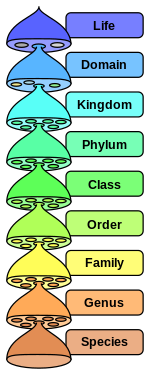(pl. genera) taxonomic group. composed of species having similar fundamental traits. Botanical classification under the family level and above the specific epithet level.
A genus (/ˈdʒiːnəs/, pl. genera /ˈdʒɛnərə/) is a taxonomic rank used in the biological classification of living and fossil organisms, as well as viruses, in biology. In the hierarchy of biological classification, genus comes above species and below family. In binomial nomenclature, the genus name forms the first part of the binomial species name for each species within the genus.
- E.g. Panthera leo (lion) and Panthera onca (jaguar) are two species within the genus Panthera. Panthera is a genus within the family Felidae.
The composition of a genus is determined by a taxonomist. The standards for genus classification are not strictly codified, so different authorities often produce different classifications for genera. There are some general practices used, however, including the idea that a newly defined genus should fulfill these three criteria to be descriptively useful:
- monophyly – all descendants of an ancestral taxon are grouped together (i.e. phylogenetic analysis should clearly demonstrate both monophyly and validity as a separate lineage).
- reasonable compactness – a genus should not be expanded needlessly; and
- distinctness – with respect to evolutionarily relevant criteria, i.e. ecology, morphology, or biogeography; DNA sequences are a consequence rather than a condition of diverging evolutionary lineages except in cases where they directly inhibit gene flow (e.g. postzygotic barriers).
Moreover, genera should be composed of phylogenetic units of the same kind as other (analogous) genera.

